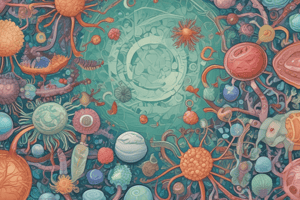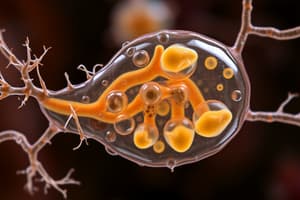Podcast
Questions and Answers
What is the primary characteristic of a prokaryotic cell?
What is the primary characteristic of a prokaryotic cell?
- Large and complex structure
- Multicellular
- Presence of membrane-bound organelles
- Absence of a true nucleus (correct)
What is the function of the cytoskeleton in a eukaryotic cell?
What is the function of the cytoskeleton in a eukaryotic cell?
- To synthesize proteins
- To control the shape and movement of the cell (correct)
- To regulate cell growth
- To provide energy for the cell
What is the main difference between prokaryotic and eukaryotic cells?
What is the main difference between prokaryotic and eukaryotic cells?
- Type of nutrition
- Number of cells
- Presence of a true nucleus (correct)
- Cell size
What is the function of the ribosome in a prokaryotic cell?
What is the function of the ribosome in a prokaryotic cell?
What is the primary function of the cell membrane in a cell?
What is the primary function of the cell membrane in a cell?
What is the characteristic of prokaryotic cells in terms of their lifestyle?
What is the characteristic of prokaryotic cells in terms of their lifestyle?
What is the primary source of energy for photosynthetic prokaryotes?
What is the primary source of energy for photosynthetic prokaryotes?
What is the main component of the cytoplasm in a cell?
What is the main component of the cytoplasm in a cell?
What is the primary function of the plasma membrane?
What is the primary function of the plasma membrane?
Which organelle is responsible for directing cell metabolism and cell reproduction?
Which organelle is responsible for directing cell metabolism and cell reproduction?
What is the main function of the ribosome?
What is the main function of the ribosome?
Which organelle is responsible for temporarily storing proteins that can be transported out of the cell?
Which organelle is responsible for temporarily storing proteins that can be transported out of the cell?
What is the primary function of lysosomes?
What is the primary function of lysosomes?
What is the main function of mitochondria?
What is the main function of mitochondria?
What is the function of the centromere in a duplicated chromosome?
What is the function of the centromere in a duplicated chromosome?
What is the characteristic of gametes in terms of chromosomes?
What is the characteristic of gametes in terms of chromosomes?
Flashcards are hidden until you start studying
Study Notes
Prokaryotes
- Lack a true nucleus and membrane-bound organelles
- Have a simple cellular structure, typically 1-10 microns in diameter
- Are single-celled (unicellular) and can be filamentous (strings of single cells)
- Have a capsule (slimy outer coating), cell wall, cell membrane, cytosol, and cytoplasm
- Contain a single, large loop of DNA (nucleoid)
- Have pili (for sticking to things), flagella (for swimming), and ribosomes (for building proteins)
Prokaryotic Lifestyle
- Can be unicellular (alone) or form colonies (a film) or filaments (a chain of cells)
- Can be photosynthetic (energy from sunlight), chemosynthetic (inorganic compounds as energy source), disease-causing (feed on living things), or decomposers (feed on dead things)
Eukaryotes
- Have a true nucleus and membrane-enclosed organelles with specialized functions
- Are larger and more complex in structure than prokaryotes
- Can be multicellular and include animals, plants, fungi, and protists (algae and protozoans)
- Have organelles, chromosomes, and a cytoskeleton that controls cell shape and movement
- Have mini organs (organelles) with unique structures and functions located in the cytoplasm
Cell Components
Plasma Membrane
- Acts as a gatekeeper, separating the cell from its external environment
- Is selectively permeable and protects the cell, providing stability
Cytoplasm
- Is a gel-like substance that dissolves substances like salt
- Is involved in osmotic regulation and contains organelles
Nucleus
- Is the control center of the cell, containing the DNA
- Directs cell metabolism and cell reproduction
Other Organelles
- Endoplasmic Reticulum: a transport system that carries materials throughout the cell
- Ribosome: a protein factory that produces protein
- Golgi Apparatus: a protein packaging system that temporarily stores protein for transportation
- Lysosome: a suicidal bag of the cell that breaks down worn-out organelles or food
- Mitochondria: the powerhouse of the cell, releasing energy from food molecules
- Vacuoles: storage boxes that store materials like food, water, minerals, and waste products
- Peroxisomes: vesicles that contain enzymes for detoxifying potentially harmful molecules
- Intermediate Filaments: intertwined protein fibers that provide support and strength
Genetics
- A gene can consist of a single DNA molecule (common in prokaryotes) or multiple DNA molecules (common in eukaryotes)
- DNA molecules are packaged into chromosomes, which consist of chromatin (a complex of DNA and protein) in eukaryotes
- Somatic cells have two sets of chromosomes, while gametes (reproductive cells) have half as many chromosomes
- The centromere is the narrow waist of the duplicated chromosome, where the two chromatids are most closely attached
Studying That Suits You
Use AI to generate personalized quizzes and flashcards to suit your learning preferences.




